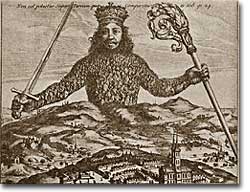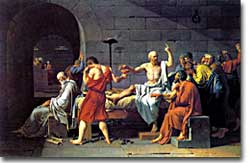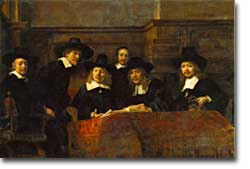
1. The Nature of Government

Is government to be feared or loved? Thomas Hobbes set out to discover that in his book Leviathan, which spawned this famous title page that depicts government as a giant towering over the land. Is the king protecting or threatening his country?
Do you believe in government "by the people, for the people, and of the people"? Few Americans would say no, especially since these words spoken by Abraham Lincoln in his 1863 Gettysburg Address are firmly imbedded in the American political system. Yet governments over the centuries have not always accepted this belief in popularly elected rule.

Jacques-Louis David painted The Death of Socrates as a metaphor for the French government during the revolution. Socrates represents the revolutionaries that martyred themselves for their principles, while the Athenian government represents the corrupt French nobility.
Even in the modern United States many skeptics criticize government as being controlled by greedy, corrupt people who are only interested in lining their own pockets. So which view is correct? Is government an instrument of its citizens, an entity that represents and protects a beloved country, or an oppressive, self-serving monster that deserves no one's respect?
If we look to the past for an answer, we find comments like these:
"Behold my sons, with how little wisdom the world is governed." -Axel Oxenstiern (1583-1654) "The government that governs least governs best." –Thomas Jefferson

Governments are everywhere. From the earliest tribe through the most recent nation to find its place on the map, government in some form has been necessary to ensure safety and order. In the 1600s, Rembrandt painted the government of the local clothmaker's guild.
The conflict, alive and well today, is solidly based in the past. Governments are sometimes idealized and often criticized. Yet virtually every society in history has had some form of government, either as simple as the established leadership of a band of prehistoric people, or as complex as the government of the United States today.
Do varying opinions of political power rise from the fact that some governments are good and others are bad? Does power corrupt leaders, or is it possible for them to administer governments fairly? The American political system is rooted in the ideal that a just government can exist, and that its citizens can experience a good measure of liberty and equality in their personal lives.
We will begin by considering reasons why governments exist, and some types of government including democracy, particularly as it is practiced in the modern United States.






